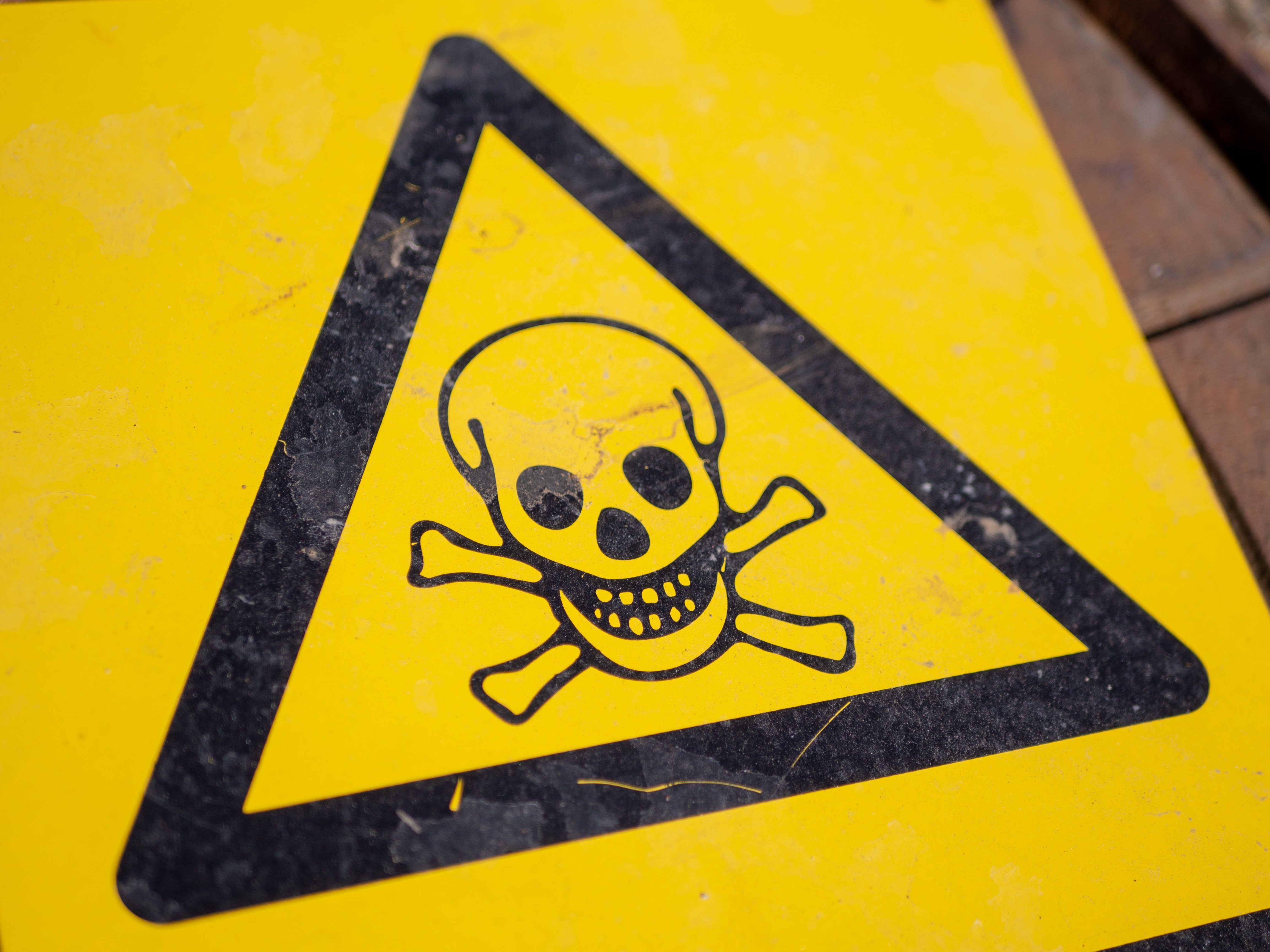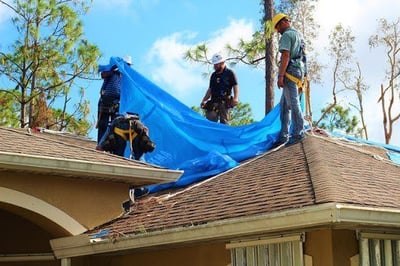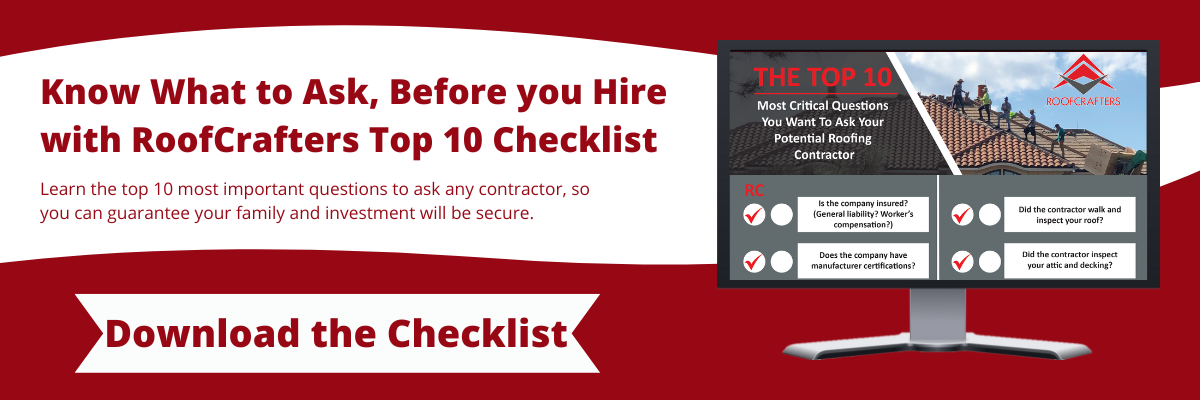Top 7 Roofing Scams: How to Identify and Avoid Them
June , 2024 | 16 min. read

Roofing scams are like unwanted house guests - they show up unexpectedly, overstay their welcome, and leave a mess in their wake. But unlike those pesky house guests, roofing scams can cost you a small fortune!
From door knockers to storm chasers, inflated storm damage claims, to disappearing contractors. These roofing scams are like a box of chocolates - you never know what you're going to get. But unlike Forrest Gump's favorite treat, these scams are far from sweet.
They're sneaky, they're clever, and they're trying to separate you from your cash.
But don't worry, we've got you covered. RoofCrafters has been helping homeowners fight the good fight for over 30 years. We'll teach you how to spot these scams from a mile away and help you avoid them like the plague.

So, buckle up buttercup, and get ready to laugh (and cry) as we take a tour of the top 7 roofing scams that are trying to sneak into your home.
Ready to expose these scams? Let's dive in.
Top 7 Roofing Scams to Avoid
- Door knockers
- Deposit scammers
- Storm chasers
- Unlicensed and uninsured roofers
- Inflating storm damage claims
- Overcharging for repairs
- Disappearing contractors
Door-to-Door Sales Tactics: How to Spot and Avoid Them
Picture this - you're sitting on your couch, minding your own business when suddenly, there's a knock at the door. It's a door knocker, and they're here to tell you that your roof is in dire need of repairs. But wait, didn't you just get a new roof last year? And why are they so insistent on getting a deposit from you right now? Fear not, dear reader, for we are here to shine a light on these shady roofing scams and help you protect your hard-earned money.

Be wary of roofing companies who go door-to-door offering deals that seem too good to be true. This is spam marketing at its best. You can expect the following:
- High-pressure sales tactics: Door-to-door salespeople may use high-pressure tactics. This is to convince you to make a quick decision without fully considering all of your options. This could lead to you making a decision that is not in your best interest.
- Lack of credentials: Door-to-door roofing salespeople may not be licensed, insured, or have a physical location. This can make it difficult to verify their credentials and track them down if there are any issues with the work they perform.
- Limited options: Door-to-door salespeople may only offer a limited selection of roofing products. They may not be able to provide all of the options that are available to homeowners. This could mean that you aren't getting the best roofing solution for your money.
Beware of Deposit Scams: Keep Your Money Safe
Deposit scams are the pranksters of the roofing world. They promise you the moon and the stars, but when it comes time to deliver, they've already taken your money and run!

These scams lure you in with a low deposit, only to up the ante later on with exorbitant fees and extra charges. It's like paying for a small bag of chips, only to find out you owe a fortune for dipping it into the guacamole. But don't let these scammers fool you, keep your cash in your wallet and avoid deposit scams like COVID-19.
- Upfront deposit scam: A roofer may ask for a large deposit before starting work only to use that money for other purposes or disappear before completing the work. This leaves the homeowner without a roof and without the money they paid. While it's not uncommon for contractors to ask for anywhere between 10-50% upfront, avoid the companies that offer large discounts for an even larger deposit.
- Materials deposit scam: A roofer may ask for a deposit to purchase materials, but then use the money for other purposes and never buy the materials. This can lead to delays in the project and extra costs for the homeowner.
Please note, it’s not uncommon for some roofing companies to ask for anywhere from 10-50% upfront.
Here at RoofCrafters, we ask all of our clients for a 40% deposit upfront. If you decide to go with any of the companies that do ask for a deposit, make sure you have a firm date for the work to begin as well as some way to cancel the payment if the work isn’t completed or the roofing company goes out of business before it has begun.
Storm Chasers: The Dangers and How to Protect Yourself
Storm chasers are like the nomads of the roofing world - they roam the country in search of their next big score. But unlike the romanticized version of a nomad, storm chasers are far from noble. They show up in the aftermath of a storm, armed with fliers and promises of cheap repairs. Only to leave you with shoddy workmanship and a bill that's through the roof (pun intended).

It's like having a carnival worker come to your house and perform a three-card Monte trick with your roof. Don't fall for their fast talk and smooth moves, steer clear of storm chasers and protect your home from their shoddy workmanship.
- Inflated damage claims: A storm chaser may exaggerate the extent of the damage to a homeowner's roof to charge more for repairs. They may also suggest unnecessary repairs or replacements to increase the cost of the project.
- Unprofessional practices: Storm chasers may not be licensed or insured in the area they are working. They may disappear after the work is completed, leaving the homeowner with no recourse if there are any issues with the work. In the worst case, they get injured while working on the roof. They may also use a different name or business than what is listed on the contract, making it hard for the homeowner to track them down.
After a major storm, some contractors will travel to affected areas to offer repair services. These "storm chasers" may not have a local business address or be licensed and insured. Be on the lookout! Wait for all the chaos to subside. Thank us later!
Unlicensed and Uninsured Contractors: A Risk You Can't Afford
Unlicensed and uninsured roofers are like the rogue agents of the roofing world! They operate outside the law, taking dangerous risks and leaving a trail of destruction in their wake. Hiring one of these roofers is like jumping out of an airplane without a parachute. Sure, you might have a thrilling ride, but you'll also be taking a huge risk with your safety and your wallet.

So, if you want to avoid a roofing disaster, steer clear of unlicensed and uninsured roofers. After all, why put your home in the hands of someone who doesn't have a license to operate or insurance to protect you?
Unless you want to deal with the following:
- Legal issues: Hiring an unlicensed contractor is against the law in most states. Homeowners could face fines or penalties if they're caught.
- Lack of insurance: Unlicensed contractors may not have liability or workers' compensation insurance. You as the homeowner could be liable for any accidents or injuries that occur on your property.
- Poor workmanship: Unlicensed contractors may not have the skills or experience needed to do a good job on a roofing project. This could lead to problems such as leaks, poor drainage, or structural damage.
- Lack of recourse: If the work is not done to your satisfaction, or if the contractor takes the payment and runs. You may have no legal recourse to get the work fixed or to get your money back.
- Warranty issues: An unlicensed contractor may not be able to provide a warranty on the work they do. Leaving you with no protection if there are any issues with the roof.
- Financial liability: If an accident occurs on your property while a contractor is working, and the contractor is uninsured. You may be held liable for any resulting injuries or damages. This could result in significant financial losses for you.
- Difficulty in getting compensation: In case of any damage caused to your property. You might not be able to get any compensation from the contractor.
- Lack of recourse: If you hire an uninsured contractor. You may have limited options for getting the work redone or receiving compensation if the work is not done to your satisfaction.
- Warranty Issues: An uninsured contractor may not be able to provide a warranty on the work they do. Leaving you with no protection if there are any issues with the roof.
It is always important to check credentials, references, and reviews before hiring a contractor and make sure they are insured. This will help to ensure that you're protected. Just in case of any accidents or issues with the work, the contractor will be liable for the damages.
Inflated Storm Damage Claims: Spotting the Lies
Inflated storm damage claims are like the little white lies of the roofing world - they may seem harmless, but they can have big consequences. These scams involve roofers exaggerating the extent of storm damage to your roof to charge you more for repairs.

It's like getting charged extra for the "deluxe" version of a rain shower when all you needed was rain. Don't let these roofers take advantage of you and your home. Protect yourself by doing your research and getting multiple quotes for repairs. That way, you can ensure you're not paying a premium for a little bit of rain.
Here are 5 of the most common tactics:
- Suggesting unnecessary repairs: A contractor may suggest that more repairs or a full roof replacement are needed. This is to increase the cost of your roofing project.
- Exaggerating the extent of the damage: A contractor may exaggerate the extent of the damage to the roof. This will allow or justify a higher repair or replacement cost.
- High-pressure sales tactics: A contractor may use high-pressure sales tactics. Just to convince you that you need more extensive repairs than are necessary.
- Scamming Insurance: A contractor may exaggerate the damage to your roof. Scamming your insurance company out of more money than is necessary, and then pocket the difference.
- Lack of experience: Some contractors may not have enough experience. They may not be able to properly diagnose the damage, so they may exaggerate the extent of the damage to cover their lack of knowledge.
Some contractors may exaggerate the amount of damage to your roof to charge more for repairs. Be sure to get a second opinion if a contractor tells you that you need extensive repairs that you don't agree on.
Overcharging for Repairs: Ensuring Fair Pricing
Overcharging for repairs is like being upsold at a restaurant. You thought you were ordering a simple roof repair. But suddenly you're faced with a bill that is larger than your entire monthly grocery budget!

These roofing scammers take advantage of homeowners who don't know the ins and outs of roof repair, charging exorbitant fees for simple fixes.
It's like paying top dollar for a fancy meal, only to find out that it's just a hot dog with a little bit of ketchup and mustard.
Don't fall for this roofing scam, protect yourself by getting multiple quotes and educating yourself on the cost of roof repairs. That way, you won't be caught off guard by a bill that is much more than you bargained for.
Some contractors may charge exorbitant prices for simple repairs. Get 2 to 3 quotes from different contractors to ensure you're getting a fair price. Here is what to be on the lookout for:
- Lack of knowledge: A homeowner may not be familiar with the typical costs of roofing repairs or replacements. Therefore they may not be able to recognize when they are being overcharged.
- Pressure tactics: A contractor may use pressure tactics to convince a homeowner to make a quick decision on repairs. Not allowing them the chance to get multiple quotes or to fully understand the scope of the work.
- Using high-pressure sales tactics: A contractor may try to convince you to pay for more extensive repairs than are needed. This inflates the cost of the project.
- Scamming Insurance: A contractor may exaggerate the damage to a homeowner's roof. Scamming their insurance company out of more money than is necessary, and then pocket the difference.
- Lack of regulation: Some states may have minimal regulation on the roofing industry. Which may make it easier for contractors to overcharge homeowners.
- Using substandard materials: A contractor may use lower-quality or substandard materials. Charging the homeowner more than the cost of better-quality materials.
Homeowners should plan to get multiple quotes. Look to work with a reputable contractor who has good references and reviews. This will help to get familiar with the average costs of repairs or replacements in your area. Also, be on the lookout for any contractor who seems to be using high-pressure sales tactics or who suggests unnecessary roof repairs.
Disappearing Contractors: How to Avoid Getting Ghosted
Disappearing roofers are like the ghosts of the roofing world. They show up with promises of fixing your roof, but then they disappear into thin air as soon as you hand over your money. It's like having a magic show where the magician never returns with your rabbit.
These roofers will take your money and run, leaving you with half-finished repairs and a headache.

Don't fall victim to this roofing scam, protect yourself by doing your research and hiring a reputable roofer. After all, the last thing you want is to be stuck with a roof that's more haunted than your local haunted house.
Many homeowners are hesitant to report the scam out of embarrassment or fear of repercussions.Such as difficulty in finding another contractor or the cost of a legal dispute.
The number of people who get scammed by roofers taking deposits is greater than reported. And that number is already too high!
Additionally, some homeowners may be unaware that they have been scammed or understand their legal rights and options for recourse. It's also important to note that some homeowners do not report the scam because they may not want to harm the company's reputation. Thinking that the company will come back to finish the work after some time.
Homeowners need to be vigilant when selecting a roofing contractor. Thoroughly research the contractor's background, references, and reviews. Homeowners should also be aware of the typical costs of roofing repairs or replacements in their area. Be cautious of any contractor who seems to be using high-pressure sales tactics. Or contractors who seem to be suggesting unnecessary repairs or replacements.
Tips for Spotting Roofing Scams and Protecting Your Home
Roofing scams are like the boogie man of the roofing world. They're lurking around every corner, waiting to take advantage of unsuspecting homeowners. But fear not, my friend!
With this article, you now have the tools to protect yourself from door knockers, deposit scams, and storm chasers. You know to look for unlicensed and uninsured roofers. Contractors who inflate storm damage claims, overcharging for repairs, and disappearing roofers.
So, arm yourself with knowledge, get multiple quotes, and never settle for a shady roofer. Remember, a little bit of humor and a whole lot of caution can go a long way in keeping your roof and your wallet safe from these roofing scams. Happy roofing!
Our family at RoofCrafters has been helping educate our clients and the communities we serve for 30 years. If you would like an honest opinion of your roof condition and live in one of our many service areas our family is here to help you. We've also put together a hiring checklist below to help you vet contractors.
At RoofCrafters, our mission is to provide job opportunities for others to thrive and grow while making a meaningful impact within our communities.





